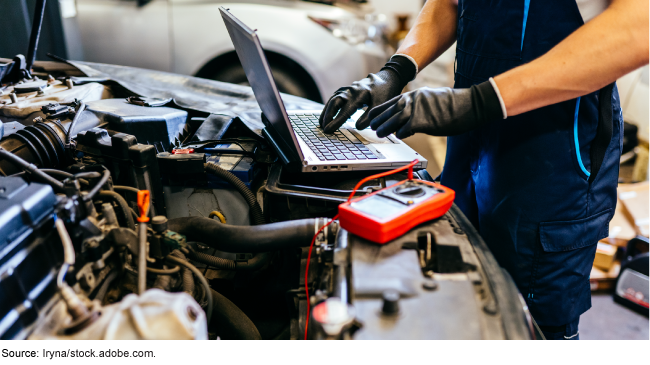Vehicle Repair: Information on Evolving Vehicle Technologies and Consumer Choice [Reissued with revisions on Apr. 5, 2024]
Fast Facts
"Right-to-repair" is the ability to repair your own vehicles or get repairs at auto dealerships or independent repair shops.
In this Q&A report, we looked at the effects of changing technologies on the right-to-repair. For example, the use of technology to wirelessly transfer vehicle health and repair data with automakers could give dealerships an advantage. If independent repair shops don't have access to this data, people might have fewer repair choices.
The Federal Trade Commission is looking at new ways to categorize consumer complaints, which could help it identify how much this issue negatively affects vehicle owners.

Revised April 5, 2024 to provide additional information on pages 12 and 13 about industry stakeholders with whom GAO met.
Highlights
What GAO Found
Right-to-repair is the ability of consumers to decide who repairs their products. For vehicles, this means consumers deciding whether to make their own repairs or take their vehicle to repair facilities at independent repair shops or dealerships franchised with automakers. Most automakers have been operating under a 2014 voluntary nationwide right-to-repair agreement. This agreement has generally resulted in independent repair shops not associated with vehicle manufacturers having access to the information, data, and tools needed for vehicle repairs. However, stakeholders GAO interviewed and a nongeneralizable review of complaints suggest that independent repair shops may face some limitations in that access.
Advanced vehicle technologies, such as electric vehicles, may make repairs more expensive and complex because they require additional knowledge, equipment, and other investments. Such issues could particularly affect some independent repair shops, that are unable to make such commitments. In addition, according to some independent repair stakeholders GAO interviewed, the use of telematics systems to wirelessly transfer data between vehicles and automakers could give dealerships a competitive advantage over independent repair shops in conducting some repairs. However, industry and independent repair stakeholders GAO interviewed agreed that telematics data are not currently needed to conduct repairs.
The Department of Transportation's National Highway Traffic Safety Administration (NHTSA) is focused on vehicle safety and its role in vehicle right-to-repair issues is limited to cybersecurity issues that could affect vehicle safety. The Federal Trade Commission (FTC) is involved in protecting consumers and promoting competition, including in the vehicle repair market. FTC is taking steps to better understand potential vehicle repair limitations by considering new ways to categorize and analyze potentially relevant consumer complaints. If independent repair shops face limitations in access to the information, data, and tools needed for repair or are otherwise disadvantaged compared to dealerships, consumers may have fewer repair choices, which may reduce competition and make repairs more expensive and inconvenient.
Why GAO Did This Study
GAO was asked to review the effects of changing vehicle technologies on vehicle right-to-repair. This report examines how changes in vehicle technologies are affecting competition and consumer choice in the vehicle repair market and NHTSA's and FTC's actions related to this issue.
To conduct this work, GAO conducted a literature search and reviewed relevant publications, conducted a non-generalizable review of vehicle and vehicle repair complaints, and interviewed over 50 industry and consumer-focused stakeholders, including vehicle manufacturers, independent repair shops, and others.
For more information, contact Elizabeth Repko at (202) 512-2834 or repkoe@gao.gov.
